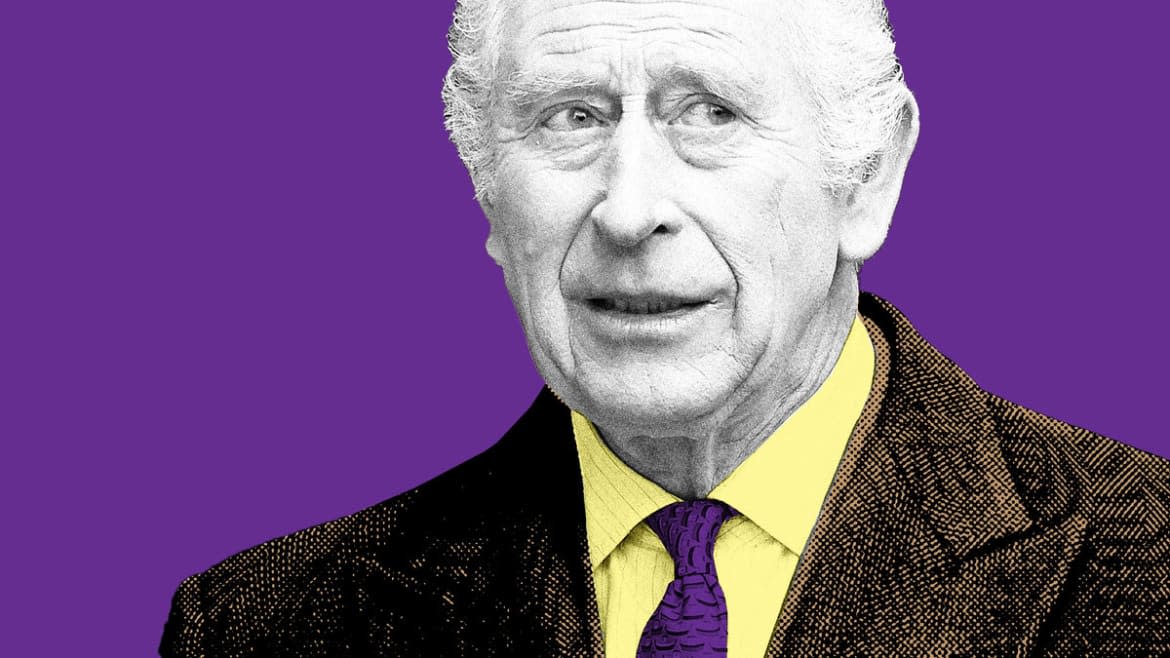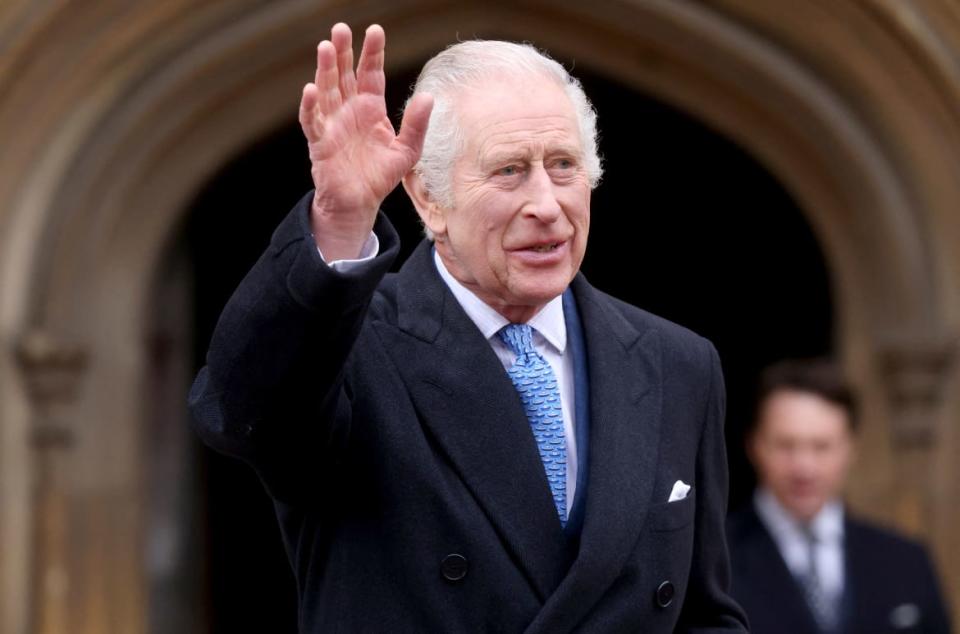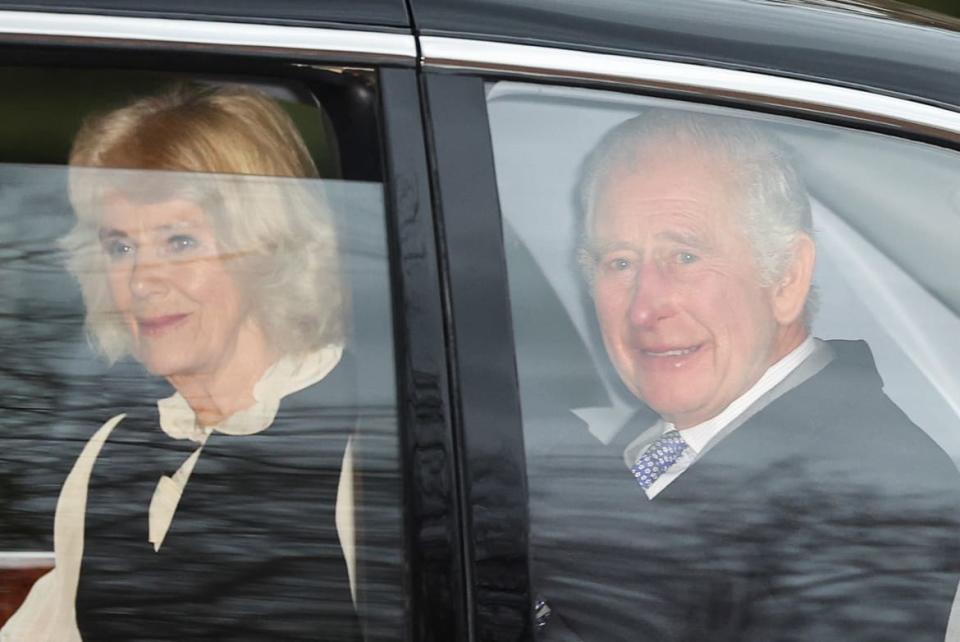King Charles’ Funeral Plans Dusted Off, as His Health Remains a Mystery

- Oops!Something went wrong.Please try again later.
It’s the question everyone in British society and in the corridors of power is thinking, but nobody will publicly ask, let alone answer: Just how sick is King Charles III? The chatter that King Charles is significantly more unwell than his aides are letting on is proliferating in British society.
Speaking to friends of the king in recent weeks about his health, the most common response is a lowering of the voice by half an octave or so, followed by the sombre, drawn-out pronouncement: “It’s not good.”
His officials didn’t respond to formal requests for comment on the matter from The Daily Beast. To be clear, his team have made it very clear, since the king disclosed his cancer diagnosis earlier this year—in an unprecedented act of royal transparency—that they wouldn’t be providing a “running commentary” on his health.
‘Gaunt’-Looking King Charles, Stricken by Cancer, Shares His Sadness
The king has never said what specific type of cancer he has been diagnosed with, apart from to say it was not prostate cancer. He is understood to be making regular visits to London for radiotherapy treatment, which can be used to treat many different types of cancer.
Of course, were Charles a private individual, his health would be nobody’s business but his own. But he is the leader of a hereditary monarchy, a head of state who can only be removed by death (or abdication, but that doesn’t seem likely to happen given the late Queen Elizabeth’s precedent). Much as his office may not wish to acknowledge it, his prognosis is very much a matter of public interest. It is certainly preoccupying some individuals in certain branches of government.
The Daily Beast has been told, for example, that not only are Charles’ funeral plans being regularly updated but that a document reviewing what went well after the queen’s funeral, and what could be done better next time a monarch dies—a kind of “lessons learned” crossed with a scorecard, the most esoteric of business reviews—is circulating in Whitehall.
The government department responsible for state funerals, the Cabinet Office, declined to comment on claims that the Operation Menai Bridge (as Charles’ funeral plan is codenamed) document is being regularly updated, but again emphasized that making no comment on such plans was routine.

Britain's King Charles leaves after attending the Easter Matins Service at St. George's Chapel.
Friends of the family and insiders are genuinely distraught at the prospect that the U.K. could lose its king far sooner than any had imagined, but they are trying to stay positive.
One old friend of the family, for example, told The Daily Beast, “Of course he is determined to beat it and they are throwing everything at it. Everyone is staying optimistic, but he is really very unwell. More than they are letting on.”
The same source told The Royalist that the late Queen Elizabeth was dying of bone marrow cancer in the months before she died, which was subsequently confirmed by royal friend and biographer Gyles Brandreth.
Compounding the sense of gloom, multiple sources have told The Daily Beast that officials are now regularly reviewing copies of the several-hundred-page “Menai Bridge” document.
All royal family members have bridge-based codewords to be used at their death—Queen Elizabeth’s death plan was famously “Operation London Bridge.” Menai Bridge is a dramatic suspension bridge that connects the island of Anglesey with the Welsh mainland.
While the sources all emphasized that the notes are routinely reviewed by the palace and the military, one source, a former staffer who retains active links with serving courtiers, said: “The plans have been dusted off and are actively being kept up to date. It’s no more than what you would expect given the king has been diagnosed with cancer. But the circulation of them has certainly focused minds.”
Another source, who knows a senior official involved in the planning of royal funerals, said: “Of course they are looking at every aspect of Menai Bridge. The queen’s funeral went like clockwork and set a high bar. It’s not an emotional thing, it’s a job, one taken very seriously, and understandably no-one plans to get caught out.”
A military source said that the plans were kept under constant review but that it would be “absurd to read anything into” that fact.
“Planning for the worst is what the military do,” they said, adding: “You’ve got to remember the scale of this thing. The Household Division, under Major General James Bowder, take the lead—that is seven regiments of Guards. Then you have the entire London District, the Territorial Army regiments and the Royal Horse Artillery. That’s before you get to the Navy or Air Force. Charles was closely associated with the Parachute Regiment for years, so they will be involved.
“That’s just the ceremonial end. Then you need a giant security operation because every VVIP on the planet is there. We’re talking everything from missile defense to guarding against a lone wolf attack. The whole thing goes from flash to bang in under two weeks which means every aspect of it needs to be meticulously planned in advance. Serious planning for Charles’ funeral began the day after they buried the queen.”
The overall co-ordinator is the so-called Earl Marshall, Edward Fitzalan Howard, the Duke of Norfolk. The honor of Earl Marshall is—bizarrely some might say—hereditary, and always held by the Duke of Norfolk, the most senior dukedom in the land.
“Eddie did a bloody good job with the queen’s funeral and the coronation. He is only 67 so he will still be in the job for Charles whenever it happens,” said a friend of the duke’s.
The possibility that Charles could die in a shorter period of time than widely imagined has not been openly mentioned by the U.K. press, but has been hinted at in broad terms. One of the most notable of these hints came on Feb. 22, in the Daily Mail’s Ephraim Hardcastle column. Ephraim Hardcastle is a fictional avatar, and the column is written and edited by a revolving cast of Daily Mail journalists, largely based on newsroom gossip.
In the column in question, “Hardcastle” wrote one item about Prince William’s plans to make changes to the accession process, and said the prince had initially been advised “to wait until after a general election before putting them on a formal footing with, potentially, a new Prime Minister.” The writer then added, “Change is in the air, but the pace won’t be as leisurely as anticipated a few weeks ago.”
In the next item, Hardcastle noted that Prince William once described (to Tony Blair) his destiny as “prison walls”; Hardcastle then said they were “closing in as his hour approaches.”

Britain's King Charles and Queen Camilla leave Clarence House, the day after it was announced King Charles has been diagnosed with cancer.
Overall, however, the British press have observed what seems like a remarkable silence on the matter of Charles’ health and funeral planning.
This is not, as one journalist told The Daily Beast, just out of respect for or collusion with the palace, but rather due to very strict rules and laws in the U.K. governing medical privacy and the publishing of personal information. “Even if you had it copper-bottomed that he had bladder cancer, you couldn’t run it,” the journalist said.
Some foreign media have also dropped heavy hints. For example, Tina Brown, the founding editor of The Daily Beast known for her impeccable royal contacts, wrote in the New York Times: “The almost simultaneous news of Charles’ cancer has put William and Catherine in frightening proximity to ascending the throne just when they had hoped for a span of years to parent their children out of the public eye. The prospect of it, I am told, is causing them intense anxiety.”
The type of cancer that the king is fighting has not been revealed by the palace, but the regular trips to London for treatment suggest that Charles is receiving radiotherapy, one cancer expert who asked to remain anonymous said. Radiotherapy is conducted using enormous machines as opposed to chemotherapy, which can more or less be done with equipment available at any cottage hospital, although the two therapies can often be used together.
As to how Charles is really doing, there has been little in the way of official updates from the palace, but plenty of straws in the wind, most notably the fact that after making a titanic and encouraging effort to greet the public at Easter, shaking hands 56 times and joking and laughing with the crowd outside St George’s Chapel in Windsor, Charles has largely vanished from public view for the three weeks since.
He has looked gaunt when seen since, when being driven to treatment in London in the ceremonial-style vehicle with large windows he has been using to make sure he is seen. More promisingly, he drove to and attended church in Scotland on Sunday.
However, it is the big diary dates that will give the most important clues on how his fight against the disease is progressing. One is his official birthday parade, known as Trooping the Color, on June 15, which the Ministry of Defence has advertised that he will be present at.
Then there have been rumors that he will attend the Royal Ascot horse racing festival later in June. A state visit to Australia, followed by a trip to Samoa for the Commonwealth Heads of Government Meeting, due to take place in mid-October, has not yet been cancelled. The palace has said planning for this trip continues.
Christopher Andersen, the New York Times best-selling royal writer, told The Daily Beast: “It’s not just the king who has to review his own funeral plans. Every senior royal does. William and Harry were only teenagers when they were asked to plan their own funerals. They’re asked to pick their own music, flowers, the prayers and who will read them. Royals are constantly reminded that when they die, their send-off will be a major, headline-grabbing event. They can’t escape this macabre fixation on death.
“King Charles’ reign will by definition be short, but it’s anyone’s guess at this time just how short. In the meantime, the tried-and-true practice of revising funeral plans should not be used to make that determination. What would be enormously helpful is for the palace to be transparent about the king’s condition and his prognosis. Until that happens, gossip and speculation will continue to swirl, and conspiracy theories will abound.”
Get the Daily Beast's biggest scoops and scandals delivered right to your inbox. Sign up now.
Stay informed and gain unlimited access to the Daily Beast's unmatched reporting. Subscribe now.

